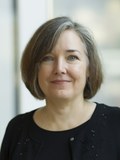Professor
UNC-Chapel Hill
Education and Training
UCLA, PhD
Areas of Interest
My research program is focused on a fundamental property of cells, which is their ability to move. We want to understand how cells make the decision to either migrate or to remain stationary and adherent, and we are working to apply this knowledge to specific conditions, such as wound-healing and tissue remodeling after injury; cancer metastasis (which results from dis-regulated cell migration); and fibrosis (a state of dis-regulated wound-healing). In order to gain new insights into the mechanisms that control these processes, my lab has pursued collaborations that span from the molecular level to the patient level. Since 2007, I have worked closely with my major clinical collaborator, Dr. Hong Jin Kim, who is a surgical oncologist; in addition, my lab has formed interdisciplinary teams with protein biochemists, biophysicists, and clinician-scientists from multiple specialties. We are currently focusing on a specific variant (isoform 4) of the actin-binding protein palladin, which is overexpressed in invasive breast cancer cells, where it contributes to the assembly of matrix-degrading organelles called invadopodia. Palladin isoform 4 occupies a very unusual molecular niche, as it shuttles from the actin cytoskeleton to the nucleus, where it appears to “report on” the organizational state of the cytoskeleton and regulate patterns of gene expression. We are actively exploring the role of palladin isoform 4 in the stroma of pancreas tumors, where is appears to play a key role in establishing the phenotype of tumor-associated fibroblasts.
Awards and Honors
Dean’s Award for Excellence in Medical Education
Affiliations
Lineberger Comprehensive Cancer Center
Academy of Educators


